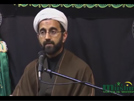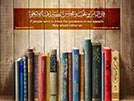Letter 4
- Details
- Hits: 2737
Letter 4
I Juristic Proofs Mandate Adherence to the Sect of Ahl alBayt,
II There is No Proof for Mandating Adherence to the Majority's Sects,
III Generations of The First Three Centuries Never Knew Those Sects,
IV Possibility of Ijtihad,
V Unity can be Achieved by Respecting Ahl alBayt's Sect.
Thul Qida 4, 1329 A.H.
1) Our adherence, in the principles of the creed, to a sect other than that of alAsh`ari, and our following in the branches of Islam of a sect other than those four sects, has never been due to partisanship nor fanaticism, nor has it been because of doubting the ijtihad of the Imams of these sects, of their fairmindedness, trustworthiness, integrity, or loftiness in knowledge and deeds.
Juristic proofs, rather, have mandated upon us to follow the sect of the Imams from the Household of Prophethood, the cradle of the Message, and the place the angels frequent, the abode of revelation and inspiration. We have always, therefore, referred to them in order to comprehend all matters related to the creed's branches and doctrines, in the roots and in the bases of fiqh, in the knowledge of ethics, behaviour, and manners. We have done all this in accordance with the judgment of evidence and proof, following the Sunnah of the Master of Prophets and Messengers, peace of Allah be upon him and all his progeny.
Had the proofs allowed us to differ from the Imams of Muhammad's progeny, or had we been able to achieve nearness to Allah, Glory to Him, by following others' sects, we would then have followed in the general public's footsteps, asserting the friendship and strengthening the ties of fraternity. On the contrary, positive proofs stand in the believer's way, diverting him from following his own inclinations.
2) Still, the majority cannot prove that their own sect must be preferred over those of others, let alone making it obligatory. We have looked into Muslims' pretexts as one inquiring in depth with keen eyes, but we have found no proof for your argument except what you mentioned of their ijtihad, trustworthiness, fairmindedness and loftiness.
You, however, know that ijtihad, trustworthiness, fairmindedness and loftiness of status are not a monopoly of them only; therefore, how, since the case is as such, can their sects be obligatory by your merely pointing them out?
I do not think that there is anyone who dares to advocate their preference in knowledge or deeds over our Imams who are the purified `itra, the nation's life-boats, the Gate of Salvation, the security against dissension in religion, the flags of its guidance, the descendants of the Messenger of Allah and his remnant in his nation. He, Allah's peace be upon him and his progeny, has said: "Do not go ahead of them lest you should perish, nor should you lag behind them lest you should perish. Do not teach them, for they are more learned than you." But it is the dictates of politics at the dawn of Islam.
I wonder about your claim that the good previous generations adhered to those sects, finding them the most fair and the best of sects, and that they agreed to adhere to them in every time and clime. You say so as if you do not know that our predecessors, the good past generations that followed the progeny of Muhammad and that, literally, constituted half the Muslim population, followed only the faith of the Imams among the descendants of Muhammad, peace of Allah be upon him and his progeny. They did not find for it any substitute, and they have been this way ever since the days of `Ali and Fatima, when neither alAsh`ari nor any Imam of the other four sects, or even their fathers, existed, as you very well know.
3) The generations of the first three centuries, then, never followed any of those sects at all. Where were those sects during those three generations, the best generations ever? AlAsh`ari was born in 270 A.H. and died in 320 A.H. Ibn Hanbal was born in 164 A.H. and died in 241 A.H. AlShafi`i was born in 150 A.H. and died in 204 A.H. Malik was born in 95 A.H.[1] and died in 179 A.H. Abu Hanifah was born in 80 A.H. and died in 150 A.H. Shi`as follow the sect of the Imams from the Prophet's Household, and the household surely know what their house contains. NonShi`as follow the sects of the learned sahabah and tabi`in; so, what makes it "mandatory" on all Muslims, after those three centuries had gone by, to follow those sects instead of the one followed before them? What made them divert their attention from those who were peers only to the Book of Allah and its own companions, the descendants of the Messenger of Allah and his trustees, the nation's ark of salvation, the leaders, the security, and the Gate of Salvation?
4) What caused the door of ijtihad to be shut in the face of Muslims after it had been kept widely open during the first three centuries other than resorting to reluctance, comfort, laziness, the acceptance of deprivation and the satisfaction with ignorance? Who would permit himself, knowingly or unknowingly, to say that Allah, Dignity and Glory to Him, has not sent the best of His Messengers and Prophets with the best of His religions and codes, nor has He revealed unto him His best Books and Tablets, judgment and doctrines, nor has He completed His Religion for him and perfected His blessing unto him, nor has He taught him the knowledge of the past and the present, except for the sole purpose that the whole matter would end to the Imams of those sects to monopolize for their own selves? They would then forbid all others from acquiring it from any other source, as if the Islamic faith, in its Book and Sunnah, and in all other signs and testaments, a property of their own, and that they forbade faring with it in any way contrary to their own opinions... Were they the Prophets' heirs, or had Allah sealed through them the successors and Imams, or taught them the knowledge of the past and the present, and that He bestowed upon them what He had never bestowed upon anybody else among all human beings?
No! They were just like many others, pillars and caretakers of knowledge, ministers and callers. Those who call for knowledge are far above closing its doors against others or forbidding others from reaching it. They never curb the minds, nor confine public attention only to their own selves, nor can they seal people's hearts or make others deaf, blind, dumb, handcuffed, or chained. This can never be attributed to them except as a liar's allegation, and their own statements bear witness to ours.
5) Let us now concentrate on the matter to which you attracted our attention: the unity of Muslims. What I see is that this matter does not depend on Shi`as forsaking their faith, nor the Sunnis forsaking their own. Asking Shi`as to do so without asking others (Sunnis) to do likewise is to prefer without preponderance, or even to favour the less preferable. It is demanding what is beyond one's capacity as it is known from our Introduction.
Yes. Unity and uniformity can be achieved if you release Ahl alBayt's sect and view it as you view any of your own sects so that the Shafi`is, Hanafis, Malikis and Hanbalis may consider the followers of Ahl alBayt just as they consider each other. Only then can the unity of Muslims be achieved, and they will be unified in one fold.
The difference among Sunni sects is not less than it is between the Sunni and Shi`a schools of thought as thousands of books on the principles and branches of the creed of both groups testify; therefore, why have several people among you condemned the Shi`as for differing from the Sunnis? Why have they not, by the same token, condemned the Sunnis for differing from the Shi`as, or even for differing from one another? If sects can be four, why cannot they be five? How come it is alright to have four sects but not five? How can four sects be considered as "unifying" Muslims, and when they increase to five unity is shattered and Muslims are divided unto themselves? I wish when you invited us to "sectarian unity" you also invited the followers of the four sects to the same. The latter will be a lot easier for you and for them. But why have you singled us out for your invitation anyway? Do you find the followers of Ahl alBayt breaking the unity while the followers of others unite the hearts and determination eventhough their sects and minds are different, their tastes and inclinations are numerous? I think of you to be above that, knowing your love for your kinfolk, and peace be with you.
Sincerely,
Sh
-----------------------------------
[1] In his biography of Malik, Ibn Khallikan indicates in his Al-a`yan that the man lingered in his mother's womb for almost three years. The same is mentioned by Ibn Qutaybah who includes Malik among wise sages on page 170 of his book Al-Ma`arif, recounting him on page 198 among men whose mother's pregnancy outlasted the normal period.










![take advantage of your [present] time](/en/media/com_hwdmediashare/files/99/f5/fb/5293162f4d04afb1ed8da3034e984340.jpg)
